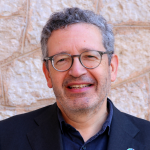06/11/2023 Opinion

Joan Miquel Canals, Commissioner for International Networks
The challenges and advantages of the universities’ networks
The Aurora project ends on 31 October and will be replaced by Aurora 2030, with new challenges ahead. The first three years of the Alliance have seen the introduction of multilateral mobility agreements that have involved exchanges of students and staff and the adoption of good practices by all. We hope that this will continue in the second period. The training activities have also made it possible to offer courses with Aurora values and for URV students to follow courses taught by partners.
In Olomouc (Czech Republic) two agreements were signed: one on mobility and the other allowing the nine partner universities to share research facilities as part of SWAFS, the Aurora research project that ends next year. This will enable our researchers to use the equipment at the other universities as well as their own. This will certainly stimulate research interaction in the Aurora area, which is necessary if we want to create a true multi-campus network.
An agreement has been signed within Aurora to share research facilities among all members of the network
But aside from Aurora, URV students also enjoy the advantages of other networks in which we are active. This year three students were able to attend the “International Student Seminar for Global Citizenship & Peace 2023” in Hiroshima, co-organised by the International Network of Universities (INU), and join in the celebration of the 25th anniversary of the network, which was also attended by the rectors of all 13 member universities. As well as attending training activities on leadership, on 6 August students were also able to pay tribute to the victims of the first atomic bomb. This is what we want for our students: peace.
